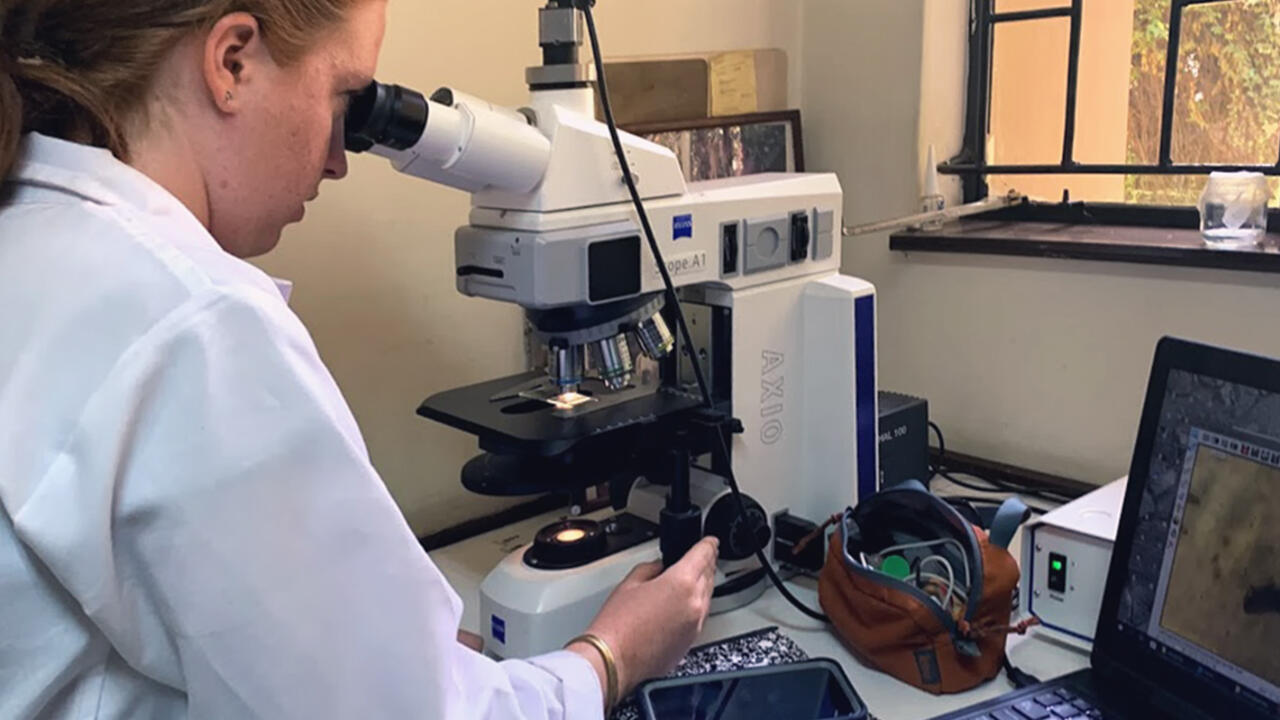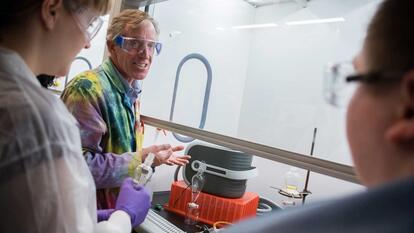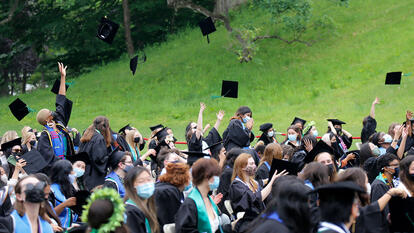How Research in Kenya Helped Georgia Oppenheim ’20 Unearth Her Career Path

Georgia Oppenheim ’20 spent the summer after her sophomore year doing anthropological research at a field school in Kenya. Inspired by that experience, she returned a year later as a staff member, the youngest in the history of the program. An anthropology major with a minor in chemistry, Oppenheim built on her skills from the previous summer and added some responsibilities: She ran her own project, mentored a student, and collected independent data that she is now turning into a thesis. For Oppenheim, gaining hands-on experience in the field while deepening her understanding of what she learned at Wellesley in her anthropology and chemistry classes was life-altering.
Here, Oppenheim speaks with her advisor, Megan Núñez, professor of chemistry and dean of faculty affairs, about her time in Kenya, what she learned there about herself and the world around her, and how all that is helping her as she applies for graduate programs in anthropology.
Photo: Georgia Oppenheim ’20 analyzes the phytolith samples (microscopic plant particles) collected from the experimental fires she set to simulate hominin controlled fires as part of her research at the National Museum of Kenya in Nairobi.
Read the full transcript below:
- [Megan] Hello. I'm Megan Núñez, I'm a Professor of Chemistry, and also the Dean of Faculty Affairs. And I'm here today with one of my students, Georgia Oppenheim, who is a chemistry minor and one of my advisees. And we're here to talk a little bit about her research experience over the last couple of years, and how that's intersected with her education here at Wellesley. So, Georgia, maybe you could start out by talking a little bit about how you got involved in research in the first place, and what kinds of projects you've been doing. - [Georgia] I started off here actually doing research in the chemistry department for a really short period of time. And then I realized how much I loved anthropology, and that I wanted to major in anthropology, and so I switched from a chemistry major to a chemistry minor, and I decided I should fulfill my passion of studying anthropology. Sophomore year I was in this human evolution class, because I absolutely love human evolution, it's my favorite part of anthropology, and my professor sent this email, just a forwarded email to the class, about this field school in Kenya. So I applied, and I got in, but I didn't get a fellowship from the organization to go, and so I had to find external funding from other sources. - [Megan] That was after your sophomore year? - [Georgia] Yes. - [Megan] So after your junior year, you went back again, a second time. So how was your experience in Kenya the second year different from the first? - [Georgia] What you do in a paleoanthropology field school is you learn field research techniques, like archeology excavations, how to survey, how to identify fossils, how to identify stone tools, just all the skills you need to be a working biological anthropologist. My second year, what was amazing is that I was, around this time last year actually, asked back as a staff member for the field school, because they really liked the research I did, and they really liked my contributions that I made, which kind of came from all my skills of my Wellesley background that kind of helped me in that way. We were going to apply for NSF funding, but NSF funding was tricky because it was around the time of the government shut down. And so I applied for other funding through Wellesley, Wellesley was able to provide me this opportunity to go back as a research intern, which basically meant that I had to run my own projects, so I collected data for my senior thesis which was amazing, and now I have a thesis to work on now. I got to mentor my own student, which was really wonderful, because it made me realize how much I enjoyed mentoring, and kind of gave me the skill that I wouldn't have been able to learn at Wellesley, and it kind of having that direct experience of mentorship made me realize how much I love mentoring and teaching, and that kind of led me down the path of, "Oh, I want to apply to graduate school "for biological anthropology and continue this teaching "and research trend that I'm doing." - [Megan] So you mentioned using your Wellesley skills, in this research project, and I'm sure you've learned many other things in this research project that you've brought back to Wellesley. So can you talk a little bit about that cross pollination between your liberal arts education and this field work that you've done in a fairly specialized field, and how the two sort of came together? - [Georgia] Yeah. So I'm in analytical chemistry right now, and it gets really nitty gritty sometimes, and it's a really hard class. But now I can kind of think broader, and be like, "Oh my God. "I could use this to study this thing in the fossil record, "or this thing at this other archeological site." I have this framework. So my chemistry classes and my anthropology classes don't feel as separate as they once did, which is kind of wonderful. - [Megan] So you mentioned graduate school, you're applying to graduate school now. So do you think you would be applying to graduate school if you hadn't had this research experience? - [Georgia] No. Probably not. Or, one thing that's really great about having this research experience now, and especially going to a site twice and having the opportunity, I was the youngest staff member at this research program, probably in their history. Most of the staff members are either in graduate school or just about to start graduate school, and even a lot of the students were still my same age. So I was a very young staff member. Having these two years of research really make me a strong candidate for graduate school, because a lot of people when they delay their graduate school admission they decide to apply a year after they leave, it's because they want to get more research experience, for some people that is. But for me, I'm a really strong candidate right now to apply for graduate school because I have this great research skill that I've learned from the field, but I also have this great Wellesley liberal arts education where I have both my anthropology skills that I've learned through my classes there, but I also have this theoretical chemistry approach that most students don't have when they're applying to graduate school. I'm so happy I was able to explore this, and I allowed myself to do that, and Wellesley was able to help me along the way during my second stint in research after I got that experience. - [Megan] Well, I think that's what we always hope for our students, right? That you'll find that passion, right? The thing that you want to do more than anything. And so it's not a bad thing that you turned away from being pre-med - [Georgia] No, or being a chemistry major - [Georgia] absolutely not. - [Megan] it's a wonderful thing that you found this field, and this future that makes you so happy. - [Georgia] The support I've received from you, and from other chemistry professors and other anthropology professors has kind of propelled me forward. Having that support, and being like, "Georgia, it's gonna work out, "you can do it. "One day I'll see you on the cover of National Geographic." - [Megan] Which, we will. - [Georgia] That support has meant the world to me, and is the reason I'm pursuing graduate school right now.



